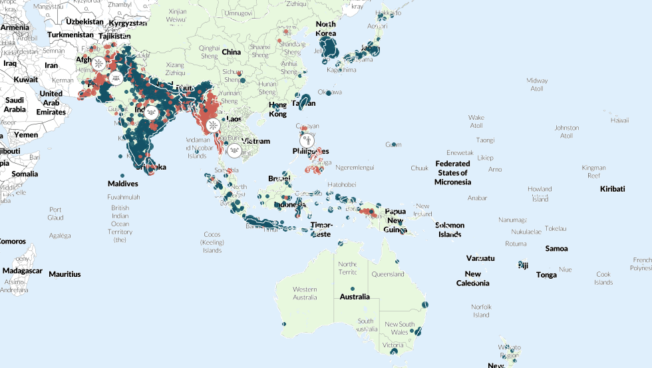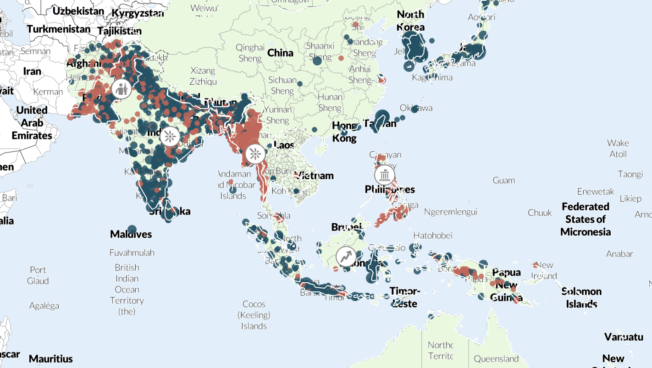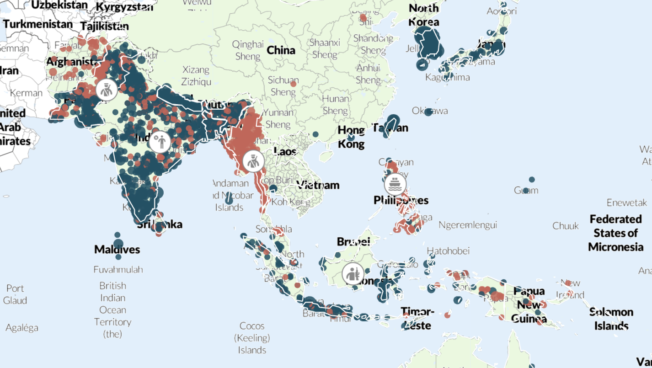Regional Overview
Asia-Pacific
January 2024
Posted: 9 February 2024
 Bangladesh: Opposition boycott and electoral violence mark the Awami League’s re-election
Bangladesh: Opposition boycott and electoral violence mark the Awami League’s re-election
Bangladesh’s Prime Minister Sheikh Hasina was re-elected to serve for a fourth consecutive term. Her party, the Awami League (AL), won 225 out of 300 parliamentary seats amid a boycott by the main opposition party, the Bangladesh Nationalist Party (BNP).1Ethirajan Anbarasan & Kelly Ng, ‘Bangladesh election: PM Sheikh Hasina wins fourth term in controversial vote,’ BBC News, 8 January 2024 In the run-up to the elections, the BNP carried out nationwide demonstrations questioning the impartiality of the electoral process and calling upon citizens to also abstain from voting (for more, see ACLED’s recent report, The Violent Politics of Bangladesh’s 2024 Elections). Voter turnout was low, with observers casting doubt even on the official figure of 40%.2Faisal Mahmud, ‘Sheikh Hasina wins fifth term in Bangladesh amid turnout controversy,’ Al Jazeera, 8 January 2024 Given the BNP boycott, independent candidates — many of whom were former AL members who had failed to receive the official nominations — won the second-highest number of seats.3Ethirajan Anbarasan & Kelly Ng, ‘Bangladesh election: PM Sheikh Hasina wins fourth term in controversial vote,’ BBC News, 8 January 2024
Violent skirmishes between supporters of AL and independent candidates took place in the run-up to the vote, leaving hundreds reportedly injured and at least eight people killed, including two on election day. As expected, the BNP and other opposition parties rejected the results and launched fresh demonstrations calling for the dissolution of the newly elected government. Despite the arrests and detentions of thousands of opposition activists ahead of the polls,4Krutika Pathi, ‘Thousands of opposition activists languish in prison as Bangladesh gears up for national election,’ Associated Press, 6 January 2024 ACLED records nearly 34 anti-government demonstrations in January. The United Nations expressed concern over violence before and after the elections, and called upon the government to respect political freedoms and human rights.5The Hindu, ‘U.S. says Bangladesh elections not free or fair; UN also voices concern over violence, irregularities,’ 9 January 2024
 India: Inter-ethnic clashes continue in Manipur
India: Inter-ethnic clashes continue in Manipur
In January, there was an uptick in political violence in the northeastern state of Manipur, as the inter-ethnic conflict between the Kuki and Meitei communities entered its ninth month. ACLED records a 78% increase in armed clashes compared to the previous month, driven by increased fighting between the two warring groups as well as with security forces. In the first half of January, suspected armed Kuki assailants reportedly killed at least eight Meitei civilians in two separate attacks, leading to increased clashes between Kuki and Meitei groups in the peripheral areas between the Kuki-dominated hill region and the Meitei-dominated valley region.6Deeptiman Tiwary, ‘Names erased & changed, houses torched: In Manipur, divide runs deep on both sides,’ The Indian Express, 23 June 2023 On the other hand, Tengnoupal district, along the India-Myanmar border, emerged as the hotspot for clashes between security forces and the local Kuki population, who have been resisting increased security presence in the area.7The Hindu, ‘Manipur tribals protest deployment of “additional” police commandos in border town Moreh,’ 22 October 2023 On 17 January, Kuki assailants attacked security posts, reportedly killing two Meitei police officers. In retaliation, police commandos indiscriminately fired at Kuki settlements and set ablaze several properties. Locals claimed that they were working in tandem with Meitei militiamen.8Arunabh Saikia, ‘Inside Manipur’s new battleground: The border outpost of Moreh,’ Scroll (India), 31 January 2024
The situation in Manipur remains tense, with deep distrust between the two communities — who live in almost complete segregation — and little prospect of a political settlement. On 24 January, Arambai Tenggol, a Meitei militia, “summoned” all elected Meitei legislators and forced them to sign a charter of demands, which included the removal of Scheduled Tribe designation for “illegal migrants,” a reference to the Kuki tribal group and one of the triggers for the current crisis.9Arunabh Saikia, ‘In Imphal, the state’s surrender to an armed Meitei militia with “Taliban-like” grip,’ 26 January 2024 Manipur’s chief minister, from the Bharatiya Janata Party, was also a signatory.10Deeptiman Tiwary, ‘Decode Politics: Who are Arambai Tenggol, the group at whose beckoning Manipur Meitei MLAs came rushing,’ The Indian Express, 27 January 2024 Meanwhile, amid claims that Myanmar-based armed groups were helping fuel the conflict, the Indian home minister announced plans to end the existing free movement agreement between the two countries.11Yaqut Ali, ‘Key Manipur Official Confirms Militant Presence Amid Moreh Violence,’ The Wire, 17 January 2024; Utpal Parashar, ‘India-Myanmar border will be fenced, no free movement: Amit Shah,’ Hindustan Times, 21 January 2024
 Myanmar: Fighting intensified in southern Shan and Chin states
Myanmar: Fighting intensified in southern Shan and Chin states
On 12 January, the Myanmar army and the Brotherhood Alliance — a coalition of ethnic armed groups battling with the military — agreed to a ceasefire during talks mediated by China. The Haigeng Agreement, whose name derives from the hotel in the Chinese city of Kunming that hosted the talks, precipitated a 40% decrease in political violence compared to the month prior in northern Shan state, home to intense fighting in recent months. This lull in fighting, however, did not extend to other states. In southern Shan state, fresh violence broke out between the Pa-Oh National Liberation Organization/Pa-Oh National Liberation Army (PLNO/PNLA) and the combined force of military and Pa-Oh National Organization/Pa-Oh National Army (PNO/PNA) people’s militia, after the latter stopped five PNLO/PNLA vehicles that were reportedly carrying weapons on the Hsihseng-Loikaw road in Hopong township. Fighting expanded to Hsihseng township, where PNLO/PNLA and its allies captured two military bases and a police station in the second half of January. The military responded with artillery shelling, over 20 airstrikes, and dropped over 100 bombs, killing at least two civilians.12Network Media Group, ‘Bombing on Nawng Htaw, Hsihseng, causing locals and IDPs to flee’, 24 January 2024; Sai Harn Lin, ‘Battles in Hsihseng intensified, the military reinforce with airstrikes and artillery shelling’, 26 January 2024 The PNLO/PNLA is a Nationwide Ceasefire Agreement signatory that recently openly joined the fight against the military.
The United League of Arakan/Arakan Army (ULA/AA), a member of the Brotherhood Alliance, continued fighting against the military in southern Chin state. Fighting persisted in Paletwa township throughout January, a strategic location that borders Bangladesh and India. With a vow to eradicate the military’s presence in the region, the ULA/AA seized all 24 military bases in the region, forcing hundreds of military troops to flee to neighboring India’s Mizoram state.13The Irrawaddy, ‘Arakan Army Declares Victory in Paletwa, Myanmar’s Chin State,’ 15 January 2024 India responded by saying it plans to erect a fence at the country’s border with Myanmar and suspend a Free Movement Regime between the two countries.14Soutik Biswat, ‘India-Myanmar: Why Delhi wants to fence the ‘troubled’ border,’ BBC News, 29 January 2024 The ULA/AA’s claim of territorial control over Paletwa also stirred tensions between Chin local resistance groups. On 24 January, fighting broke out between the Maraland Defense Force, backed by the ULA/AA, and the combined force of Chin National Army (CNA) and Chinland Defense Force — Mara (CDF-Mara) nearby Lalengpi town, resulting in two fatalities.
 North Korea: North Korea ramps up military drills and weapons testing
North Korea: North Korea ramps up military drills and weapons testing
In January, tensions in the Korean peninsula rose as North Korea continued to ramp up weapons developments and test launches. Between 5 and 7 January, North Korea fired hundreds of artillery shells off the country’s west coast in violation of the 2018 inter-Korean agreement.15YNA, ‘Koreas halt all ‘hostile’ military acts near border,’ 1 November 2018 Following these drills, North Korea launched multiple test launches of advanced weaponry. In its first ballistic missile test of the year, North Korea launched a new solid-fuel intermediate-range missile with hypersonic capabilities on 14 January. In addition, a nuclear-capable underwater drone was also fired on 19 January. North Korea also launched cruise missiles into the sea on 24, 25, 28, and 30 January. The tests have come as tensions peak on the Korean peninsula ahead of South Korea’s parliamentary elections in April, reaching their most elevated levels in years. North Korea has rapidly advanced its weapons development at an unprecedented rate, accompanied by nuclear threats directed at the US, South Korea, and Japan.16Kim Tong-hyung, ‘North Korea fired cruise missiles in 3rd launch of such weapons this month, South Korea says,’ The Associated Press, 30 January 2024
 Papua New Guinea: Country descends into chaos during police strike
Papua New Guinea: Country descends into chaos during police strike
Deadly rioting led to at least 25 reported deaths across the country after police and other public sector employees went on strike and staged a march to the parliament in the capital, Port Moresby. During the march, on 10 January, some demonstrators overran the gate of the parliament building and torched a car outside the compound. Public sector employees launched their strike after seeing their latest paychecks were reportedly reduced by up to 50%. The government blamed the cut on a computer glitch, saying that the next month’s payment would fix the error and include the missing salary.17Frances Mao and Kelly Ng, ‘Papua New Guinea: At least 15 dead after major rioting and looting,’ BBC News, 11 January 2024 The police strike paved the way for looters to raid retail outlets and ATMs across Port Moresby, with some police allegedly encouraging the looting.18Andrew Anton Mako, ‘January riots in PNG: underlying causes, implications and the future,’ Devpolicy Blog, 19 January 2024 Rioting spread across the country in a ripple effect, including in Lae, Kokopo, Bulolo, Mdang, Goroka, Kavieng, Kundiawa, and Rabaul. The military was called in to restore order, reportedly alongside some police units back on duty. On 11 January, Prime Minister James Marape declared a 14-day state of emergency in the capital, suspended the chief of police and top bureaucrats in the finance and treasury departments, and announced an investigation into the looting. As a result of the unrest, an estimated 5,000 Papua New Guineans lost their jobs, and many people were unable to access basic goods and medicines as stocks were looted.19Rebecca Kukku, ‘Four suspended,’ The National, 12 January 2024
 South Korea: Violent attacks on politicians ahead of elections in April
South Korea: Violent attacks on politicians ahead of elections in April
In South Korea, two rare acts of violence against politicians took place in January, just months before April’s parliamentary elections. On 2 January, Lee Jae-myung, leader of the main opposition Democratic Party of Korea (DPK), was stabbed in the neck by a 67-year-old man. The assailant was apprehended on the scene and later indicted for attempted murder and violating the Public Official Election Act.20Yoo Cheong-mo, ‘Lee assailant indicted for attempted murder, election law violation,’ YNA, 29 January 2024 Three weeks later, a ruling People Power Party lawmaker, Bae Hyun-jin, was hit in the head with a rock multiple times by a 15-year-old middle school student. While the exact motive behind these assaults is still under investigation, observers have noted that the attacks come amid heightened political polarization in the country.21Jung Da-hyun, ‘Why are politicians targets of frequent attacks?’ The Korea Times, 26 January 2024 South Korean politicians condemned the recent attacks on their associates and underlined the need for action to contain copycat assaults.22Shin Min-jung, ‘Spate of attacks unnerves Korean lawmakers as they head into campaign season,’ Hankyoreh, 29 January 2024 Ahead of the general election in April, police announced the establishment of a task force to improve security for politicians.23Kim Han-joo, ‘Police to form task force to enhance safety of politicians ahead of elections,’ YNA, 29 January 2024 While acts of political violence are extremely rare in South Korea, election periods have been an exception. Ahead of the country’s previous parliamentary elections in 2020, ACLED records five attacks targeting candidates and their supporters.
See More
See the Codebook and the User Guide for an overview of ACLED’s core methodology. For additional documentation, check the Resource Library. Region-specific methodology briefs can be accessed below.
Links:
- Methodology and Coding Decisions for Political Violence and Demonstrations in Afghanistan
- Methodology and Coding Decisions for Political Violence and Demonstrations in China
- Methodology and Coding Decisions for Political Violence and Demonstrations in Myanmar
- Methodology and Coding Decisions for Political Violence and Demonstrations in North Korea
- Methodology and Coding Decisions for the Philippines Drug War







